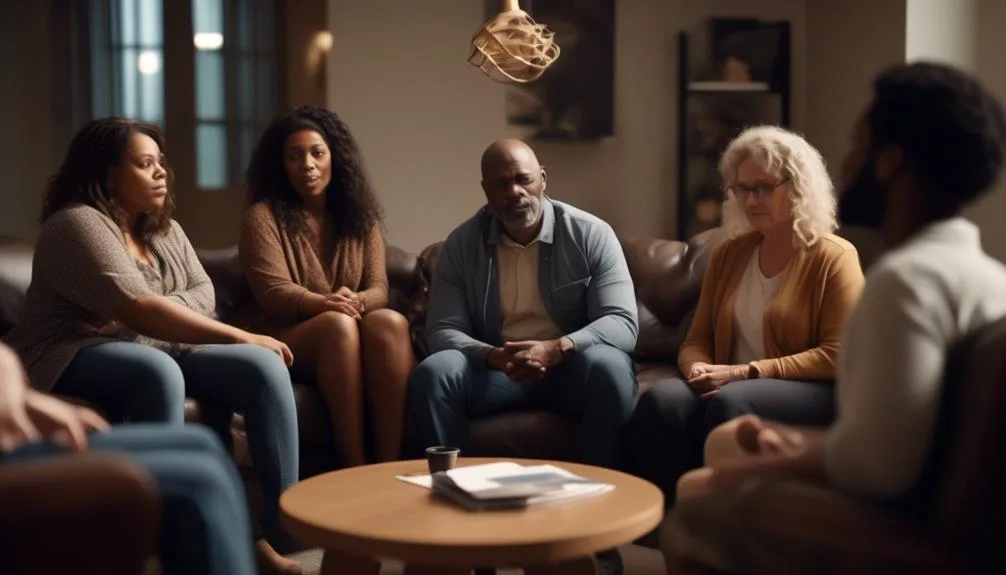Are you tired of feeling like your relationships are stuck in a never-ending loop, lacking the harmony and connection you desire?
It's time to unlock the potential of family therapy and revolutionize your relationships. Step into a world where communication is improved, conflicts are resolved, and support is readily available.
Discover the transformative power of family therapy as we unravel the secrets to building stronger, healthier, and happier family units.
But what exactly makes family therapy so powerful? Stay tuned as we delve into the multitude of benefits and explore the various approaches that can bring about a revolution in your relationships.
Key Takeaways
- Family therapy aims to enhance communication, resolve conflict, and support families by changing relationship patterns and communication.
- Different approaches to family therapy include working with couples or the entire family, improving overall functioning, and addressing specific relationship issues.
- Communication theory plays a crucial role in family therapy, helping therapists identify and resolve conflicts through strategies like active listening, empathy, and assertiveness.
- There are various types of family therapy, including structural, psychodynamic, narrative, functional, Bowenian, behavioral, cognitive-behavioral, and emotionally focused therapy, each with its own focus and techniques.
The Benefits of Family Therapy
Family therapy offers numerous benefits to individuals and families, fostering healthier relationships and improving overall family dynamics.
When it comes to improving communication, family therapy provides a safe and supportive space for family members to express their thoughts and emotions openly. A skilled therapist helps facilitate effective communication techniques, such as active listening and assertiveness, which can lead to better understanding and connection between family members.
Additionally, family therapy is instrumental in resolving conflicts within the family. Through guided discussions and problem-solving strategies, therapists assist families in addressing and resolving conflicts in a constructive manner. This not only helps in finding solutions to specific issues but also strengthens the family bond and promotes a more harmonious and peaceful environment.
Different Approaches to Enhancing Relationships

To enhance your relationships, it's important to explore different approaches that can bring about positive changes and foster deeper connections. Understanding relationship dynamics and engaging in therapeutic interventions can be transformative.
Therapists who specialize in family therapy utilize a range of approaches to address the unique challenges faced by each family. These approaches aim to improve communication, resolve conflicts, and enhance overall family functioning. Whether it's through structural and strategic family therapy, psychodynamic/psychoeducational therapy, narrative family therapy, or other models, therapists work collaboratively with families to identify and reframe patterns that contribute to problems.
The Role of Communication in Family Therapy

As you continue your journey to enhance your relationships, it's crucial to recognize the pivotal role that communication plays in family therapy.
Effective communication is the foundation for improving family dynamics and resolving conflicts. Family therapy techniques focus on identifying communication patterns and behaviors that contribute to problems within the family unit. By understanding these patterns, therapists can suggest approaches that encourage understanding and reduce conflict.
Strategies such as active listening, empathy, and assertiveness are employed to improve communication and foster healthier relationships. Through communication theory, therapists gain insight into verbal and nonverbal messages, enabling them to identify and resolve conflicts more effectively.
Exploring Various Types of Family Therapy

In the realm of family therapy, a multitude of approaches and techniques exist to address the unique needs and challenges faced by families. Therapeutic techniques vary, allowing therapists to tailor their approach to best suit the specific dynamics of each family. Understanding family dynamics is crucial in selecting the appropriate type of therapy.
Structural and strategic family therapy focus on the systemic processes within the family, while psychodynamic/psychoeducational therapy explores past experiences and relationships. Narrative family therapy reframes problems through storytelling, and functional family therapy fosters cognitive and behavioral changes. Bowenian family therapy emphasizes past relationships and the family as a unit, while behavioral and cognitive-behavioral family therapy helps identify and replace unhelpful thoughts.
Emotionally focused therapy for families combines self-focus with a systems outlook. By exploring these various types of family therapy, families can find the approach that best suits their needs and fosters positive change.
The Impact of Online Marriage and Family Therapy

Now let's explore how the advent of online therapy has transformed the landscape of marriage and family therapy, offering new opportunities and possibilities for families seeking support and guidance. Online marriage and family therapy, also known as teletherapy, has become increasingly popular and has its own set of benefits and challenges.
| Benefits of Teletherapy | Challenges of Remote Counseling |
|---|---|
| Convenient and accessible – You can receive therapy from the comfort of your own home, eliminating the need for travel and saving time and money. | Technical difficulties – Sometimes, there may be issues with internet connectivity or video/audio quality, which can disrupt the therapy session. |
| Increased flexibility – Online therapy allows for more scheduling options, making it easier to find a time that works for everyone involved. | Limited non-verbal cues – Communication through a screen may make it more difficult for therapists to interpret non-verbal cues accurately, potentially impacting the effectiveness of therapy. |
| Greater privacy and anonymity – For families who value privacy, online therapy offers the opportunity to receive support without the fear of being recognized in a physical therapy setting. | Potential distractions – Being in your own environment during therapy sessions may lead to distractions that can inhibit the therapeutic process. |
Despite the challenges, the benefits of teletherapy can greatly outweigh the drawbacks. It provides a convenient and accessible way for families to receive the support and guidance they need, all from the comfort of their own homes. The flexibility of online therapy can make it easier to fit sessions into busy schedules, and the added privacy and anonymity can be particularly valuable for those who prefer a more discreet approach. While there may be technical difficulties and limitations in interpreting non-verbal cues, therapists who are skilled in online therapy can navigate these challenges and still provide effective treatment. Overall, online marriage and family therapy has opened up new possibilities for families seeking help, revolutionizing the way therapy is conducted and making it more accessible to all.
Revolutionizing Relationships Through Family Therapy

Revolutionize your relationships through the transformative power of family therapy.
When it comes to healing dynamics and improving the quality of your relationships, family therapy offers a wealth of transformative techniques. By engaging in this collaborative process, you and your loved ones can address underlying issues, improve communication, and create healthier relationship patterns.
Through the guidance of a skilled family therapist, you'll gain insight into the dynamics that contribute to conflict and learn effective strategies to resolve them. You'll explore the impact of past experiences on your current relationships and develop new ways of relating to one another.
Family therapy isn't just about solving problems; it's about fostering understanding, empathy, and growth within your family unit. Embrace the opportunity to revolutionize your relationships and experience the profound impact of family therapy.
Frequently Asked Questions
How Long Does Family Therapy Typically Last?
Family therapy typically lasts for several months to a year, depending on the specific needs of the family. While it may require a commitment of time and effort, the long-term benefits and success rates make it worth considering.
How Often Are Family Therapy Sessions Scheduled?
Family therapy sessions are typically scheduled on a regular basis, depending on your specific needs and goals. Regular sessions offer the opportunity for consistent support, growth, and progress in improving your relationships and overall family dynamics.
Can Family Therapy Be Effective if Only One Family Member Attends?
Family therapy can still be effective if only one family member attends. While it may take longer to see results, individual participation can lead to improved communication and understanding within the family dynamic.
Are There Any Specific Qualifications or Certifications Required for Family Therapists?
To become a family therapist, you'll need specific qualifications and certifications. These credentials ensure that therapists have the necessary training and expertise to provide effective family therapy. It's important to meet these requirements to ensure quality care for families.
How Do I Know if Family Therapy Is the Right Choice for My Family?
If you're unsure if family therapy is right for your family, consider its benefits and effectiveness. It can improve communication, resolve conflicts, and enhance relationships. A qualified therapist can help guide you through the process.
Conclusion
So, if you're ready to revolutionize your relationships and create a happier, healthier family unit, don't hesitate to explore the power of family therapy.
By enhancing communication, resolving conflict, and providing support, family therapy can transform your dynamics and bring about positive change.
Take the first step towards a brighter future for you and your loved ones. Start your journey with family therapy today and witness the remarkable results it can bring.
Remember, revolutionizing relationships begins with the power of family therapy.

